#thai culture
Text

#ชุดไทย#chut thai#ชุดไทยพระราชนิยม#chut thai phra ratcha niyom#ชุดไทยจักรพรรดิ#Chut Thai Chakkraphat#thailand#thai fashion#thai folk#thai costume#thai culture#thai outfit#thai attire#southeast asia#women's fashion#woman fashion#asian#asia#asian folk costume#asian folk#asian fashion#asian outfit#asian attire#asian costume#asian culture
211 notes
·
View notes
Text
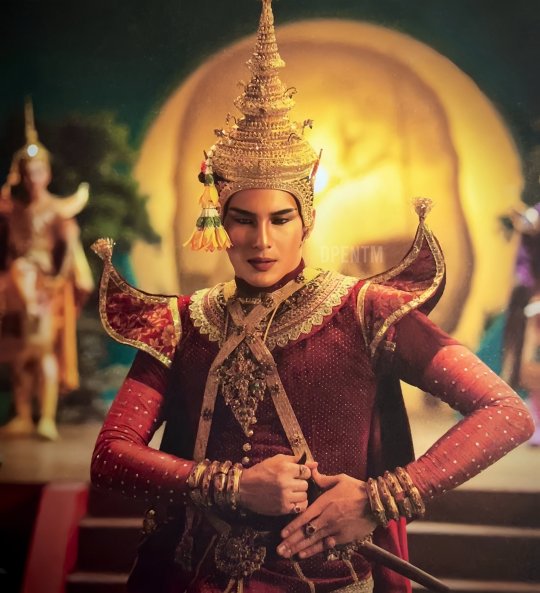
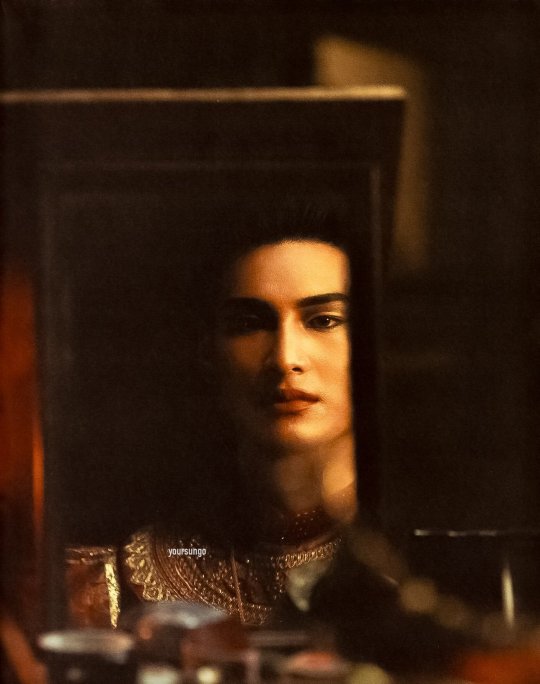

Obsessed with Khem and his Costumes and his Face ♥️
182 notes
·
View notes
Text
The Influence of Thai Culture on Attitudes towards Disabilities as it Relates to Last Twilight
(This is a combination of personal experiences/observations having lived in Bangkok and my learned academic knowledge/own personal research. I am not an expert by any means, but I wanted to offer some insight from my own personal point of view.)
While Thailand has certain provisions in place to prevent disability discrimination, it is still very much present in Thai society. Disability legislation is not strictly enforced and accessibility is extremely limited. That is not to say that efforts aren't being made to promote education and inclusivity, just that views and attitudes toward individuals with disabilities have been slow to reform. As such, there is a negative stigma that exists in Thailand where disabled individuals are, for the most part, seen as a burden or an inconvenience. There are certain cultural aspects that, unfortunately, contribute toward this outlook:
Collectivism and Tradition - Thailand can be labeled as a collectivistic society. What that means is, there is a tendency to favor the 'grouped' majority over individual interests. As a result, individuals with disabilities are less likely to be integrated into their communities. The urge to conform to group rules and traditions hinders Thai society from accepting "disruptive" change. Communities prefer to avoid the uncertainty and ambiguity of the unknown, which reduces the amount of conversations centering around disability education. I stated in my review of LT, that there needed to be a deeper conversation surrounding the experiences and realities of the disabled community in order for the series to have the impact it intended to. And this is why. It needs to be talked about, otherwise nothing will change and, much like the last part of that final episode, ableist views/language will prevail.
Religious Influence - At this point (if you are a fan of Thai dramas), you probably already know that Buddhism is the predominant religion in Thailand. We are taught to be merciful towards the weak and to give of ourselves to those who are less fortunate. While helping others should absolutely be seen as morally good, these viewpoints can also give rise to societal stigmas surrounding disabilities. Receiving unsolicited assistance as a disabled person became a constant question of: are you genuinely concerned out of kindness OR because you somehow see me as 'less than' and therefore feel you have a moral obligation to step in. In LT, I understood Day's insistent worry of being on the receiving end of someone else's pity. There was a reason why it was so prevalent in his story and why he questioned the motives of others' actions so frequently. Because Thai culture has inadvertently labeled disabled people as being 'frail' and 'in need' and who should, therefore, be met with sympathy.
Caregiving - While there are social welfare programs and services available in Thailand, generally, it is the responsibility of the family to care for and provide for their disabled relatives. Intergenerational care is a big part of Thai culture, but in this instance it's not entirely positive. The broader Thai society infantilizes people with disabilities, which means they are often disallowed from making their own decisions by those who care for them (sound familiar?). As a result, they live under less than ideal conditions that exclude them from being active members of their communities. It's upsetting that people with disabilities exist largely out of the public eye, when opportunities to be present in society and engaging with their community could potentially change their status and offset stereotypical attitudes. One of the best parts of LT that I will continuously praise it for, is Mhok's version of caregiving that completely turns these views on its (their?) head. He's not afraid to stand up to Day (or how Day's been conditioned to feel toward his blindness) and gently pushes him toward self acceptance and engagement within his community. Mhok is subtle in a way that he does what is required of him as a caregiver without ever taking away Day's agency. And that was extremely important to see against Day's mother's more 'traditional' care.
Treatment - I'm not well versed when it comes to Thai healthcare. I do know that outside of traditional medicine, access to more advanced modern treatment is highly dependent on income and social standing. Other than that, it is a disabled person's prerogative to seek treatment if a treatment exists for their disability and is accessible to them. It is also their prerogative to refuse treatment. Neither decision should be judged or actively swayed by outside perspectives (though this happens more often than not). It is highly plausible that someone in Day's position, coupled with his mother's status, would have both the access and the desire to receive a corneal transplant surgery. The outcome of Day's vision being restored was never the issue for me. The fault lies in its execution and what was implied in the aftermath.
...that's all I got. I don't really know how to end this...I'm tired.
(Please note, this is not at all meant to paint Thailand in a bad light. Thai society is fairly accepting of individuals with disabilities and positive attitudes do exist, but certain perspectives need to change!)
tagging @lurkingshan @waitmyturtles @shannankle
#last twilight#thai culture#thai attitudes toward disabilities#some of this can be overlapped with MLC#as i was writing this i kind of realized#the reason i never like to share the specifics of my nerve disorder is because i've been conditioned not to#oof...that was a hard pill to swallow
187 notes
·
View notes
Text
A Very Hum Bar Songkran
This is for @kpquickndirty, remix welcome.
This is ALSO for @songkranfest.
I've written this super-duper quickly, so it's probably a mess, but that's all part of the quickndirty fun. Inspiration from all over but mostly from here and here.
~~~
Porsche is up to something. Yok can always tell when Porsche is up to something.
“Only hand-sized water pistols are allowed inside the bar!” Ball shouts out as a small group enters. “You can leave your soakers in the bin by the door and collect them on the way out! Your first drink tonight comes with a free water pistol.”
Hum Bar is always a festive place, but it’s especially festive during Songkran. Yok has taken care to strew the place with fresh flowers, and she’s placed mats on the floor to prevent slipping, as patrons playfully squirt each other with small, brightly colored plastic water guns.
Everyone is smiling, and laughing, as it should always be in Hum Bar.
But Porsche… Porsche is far too quiet. He’s been whispering to the other bartenders whenever he thinks Yok isn’t watching, and his eyes shift nervously left and right.
He’s doing it again right now. He’s watching the door and muttering something to Jet behind his hand.
Then Tem comes in, carrying a bouquet of flowers.
“Now!” Porsche shouts. “Jom, get jae now!”
Yok’s first instinct is to brace herself to be soaked with water, but instead Jom, Porsche’s most precious and loyal friend, takes both of Yok’s wrists in his hands.
“Come with me, over here!” Jom says, and he guides her to the corner booth, where Tem has cleared space and is placing the flowers on the table.
Yok has an inkling of what’s going on now, and she wants no part of it. “Stop, stop at once!”
Porsche comes out from behind the bar, carrying a large silver bowl in his hands, full of water and flower petals.
“Hello, attention please!” Porsche calls out, and the din dies down as everyone turns heads to look at him. “Thank you, all of you, for joining us and celebrating Songkran with us! We’d now like to invite everyone to greet our senior, the wonderful, beautiful, talented, wise owner of this bar, Yok! She’s a little shy, but don’t let that stop you.”
Everyone laughs.
“I told you a million times, I am not an elder!” Yok objects. Porsche has tried to pull similar stunts before, one-on-one, in the back of Hum Bar or before a shift, but never in the middle of the night. Never before has he done it on this sort of scale, inviting all the guests to participate.
Sneaky, clever boy. It’s much harder for Yok to refuse, especially as the guests shout and encourage her to play along.
“Please, Yok?” Porsche asks. He approaches the table and sets the silver bowl in front of her, and Jet places the smaller one next to it. Then Porsche turns on the puppy eyes.
Yok feels her heart swell.
She’s objected for years, not feeling like it was her place, and also not wanting to feel old. But…
“Please?”
How can she say no?
“Oh, all right,” she relents, which causes everyone to cheer. “But let’s make this quick, so you all can get back to buying my booze, huh?” That earns her another laugh.
So, one by one, the patrons bow their heads to her, and they use the smaller bowl to respectfully run water over her hands until her fingers feel soft and tender. She gives each of them a word or two of advice while they listen with folded hands. Her words are pleasant little phrases that lift their hearts and make them smile.
The bartenders take their turns after the patrons. And of them, Porsche approaches her last. He holds her hands gently and looks up at her with something eager and desperate in his eyes, and Yok’s heart goes out to him.
After he washes her hands, she puts her soggy fingers on one of his cheeks.
“So naughty and stubborn,” she says, patting his cheek, and he has the grace to lower his eyes, even though he still smirks. “You finally found a way to make me cooperate, huh? After, what, four years?”
“Five,” he corrects.
“Cheeky,” Yok says.
“Do you have any words of wisdom for me, jae?”
What advice can she possibly give him? This boy has already been through things that Yok can hardly imagine. He’s practically a father to his brother, and he carries his family on his shoulders.
But still…
“You’re twenty-three now, aren’t you, Porsche?” she asks, and he nods, smiling. “Do this elder a favor and find someone who will fill your heart with joy and maybe look after you for a chance.”
At first, Porsche looks stunned. HIs face goes slack, like the possibility never even occurred to him. Then he grins and shakes his head.
“Aww, but flying solo is best way to—”
“Did I stutter?” Yok glares.
Porsche looks suitably terrified.
“No, ma’am.”
“Good.” Yok pulls out one of the water pistols she has tucked into the waistband of her skirt and aims it at Porsche. “Back to work with you.”
She pulls the trigger three times in rapid succession, and Porsche yelps.
#songkranfest2024#songkran#thailand#thai culture#kinnporsche#fanfic#my fic#porsche kittisawat#yok#kpquickndirty
98 notes
·
View notes
Text


My wonderful wife stopped by the theater on her way home from work to grab me a BEAUTIFUL Thailand only, limited edition poster of my favorite superhero since I even knew what a superhero was, Monica Rambeau, drawn by the incredibly talented Maiimou
😭😭😭 ♥️ yes I WILL be cosplaying this version too!! I love her so much!!
191 notes
·
View notes
Text
Info for writer in Thai series fandom: More language thingy
Swear words and metaphor
*Some words may have more meaning than what I mention.
ไอ้ Ai and อี ee = words to be added in front of other words (a name or swear word), showing contempt or closeness (in a rude way).
Ai is masculine and ee is feminine, but nobody actually cares at this point.
เหี้ย hia or เชี่ย shia = Varanus salvator
These two words are the same. Hia is an original, and shia is a word that is born from distorting the voice in order to reduce vulgarity. It's kind of like referring to an f-word with any other word starting with f. We also used many other words that mean "Varanus salvator" as a sensor version of the "hia" swear word. little crocodile or chicken eater, for example.
They can also be used to empathize by adding to the end one or two times, for example, "super cool" would be "cool hia hia".
Tbh, whenever I read in English and see the word "hia," I always think of this word before a word that means "older brother." And to make it worse, the placement of both of them in the sentence can be exactly the same. Sometimes it took me an embarrassingly long time to realize the writer intended it to be an older brother.
สารเลว saraleo = miscreant, bastard, swinish, vile, caitiff, rascally
If you are 2gether fan, this is the word Tine calls Sarawat.
There are many similar words, such as
rayam-ระยำ-wicked, disgusting, inauspicious
chanrai-จัญไร-vile, unfortunate, ruined, crush
chatchua-ชาติชั่ว-lowlife
เสือก sueak = to meddle in matters that are not their own; to meddle in other people's affairs
ห่า har = infectious disease (cholera), pestilential disease (plague), and the evil spirit responsible for disease epidemics.
สัตว์ sus =animal
พ่อง pong=your father
แม่ง maeng =your mother
They are shorten from por(father)/mae(mother) mung(you)
ดอกทอง dok thong=whore
This word sounds like a golden flower, but it's just a coincidence as far as I know.
ส้นตีน son teen=heel=lowest point of your body
ควย kyua=cock
หี hee=vagina
สันดาน san dan=in-born traits
as in bad inborn traits. The "bad" is omitted on the assumption that everyone understands.
ตอแหล tor lear=liar, fake
-->sato (สตอ-Crudia chrysantha Schum)-->strawberry
เปรต pret=The hungry ghost, frequently described as a very tall monster with a needle-sized mouth. = tall(negative meaning) or a bad person
อ้อย oi=suger cane=อ่อย oi=attempt to entice something or someone to be caught (typically used by a woman seducing a man).
For example, a cane truck has overturned here.=Someone here is trying really hard to seduce someone.
งิ้ว ngiw=bombax anceps (thorn-covered tree)
In the story, when sinners go to hell, the adulterer must climb this tree naked.
Mark from Love Mechanics asks on Facebook how hurtful it would be to climb a ngiw tree after having sex with Vee, implying that he is at least interested in someone who is not single.
Gold fish=short memory
Tiger=flirtatious person who is good at getting who they want (typically a guy)
A tiger with faded stripes=old tiger=someone who used to be flirtatious but is no longer.
Dog can be alot of things depent on the context but usually a bad things.
"Dog with a rotten head" means someone nobody wants to get close to or interact with.
If someone looks just like a dog, that means their current state is bad. Too drunk = like a dog. Crying too much = like a dog.
Giving someone dog food means making someone, usually your friends, a dog. Used when you complain about your love life to someone, ask them for advice and they tell you to leave your current partner since the partner is being awful to you, you say so! Then you turn around and reconcile with your partner. So now your friend is a bad guy whom your partner won't want you to associate with anymore because they incite you to be at odd witn your partner.
Temple's dog = low status, usually used for a low-status man who likes a high-status woman who would be called ดอกฟ้า(dokfha) which translates directly to "sky flower." Use something like, "You are a temple's dog yet want to pluck a sky flower, you should know your place!"
A dog that serves someone means someone who only cares about serving their boss (who is a bad person) and nothing else, like morals or other people. A lackey
Bird(quite a new slang) = Can't get what you want, typically means someone you want as a lover.
Phonix = immortal bird = repeatedly failing to get what you want *We do use phonix as a poetic expression too, not just for this meaning.
Buffalo = idiot/fool.
You can say A is putting horns on B when A is cheating on B; this means A makes B an idiot for believing in A.
When you fail your exam, you might say that these days you eat grass instead of rice (like a buffalo).
There is a saying that goes like this: "One who remembers when they get hurt (and leaves or does something to not get hurt again) is a human; one who is willing to endure it is a buffalo." If you put up with something you shouldn't, you are a buffalo.
Pig
fat
weak/easy to win against
Fox
Cunning
Sedusing
catfish,termite=ugly
rhinoceros=Someone who tries to steal someone else's lover or just acts inappropriately in general according to the traditional feminine standard. Originally, it was only used to call women, but it is no longer the case.
barking deer=gay man
gibbon=woman
It was originally used by trans women to refer to cis women. can be seen as rude, but like many other words, many people don't actually take offense if it is used playfully. These two words, "barking deer" and "gibbon," are usually used together.
The reason why a character does not always know information stated in the subtitle
Gender of someone
The Thai language, for the most part, is gender-neutral. The she or he in the English subtitle usually has to be chosen by the translator.
Who/what the speaker is talking to/about
Many times, sentence structures in spoken language won't require a subject or object. I guess when that gets translated, it looks weird, so the translator has to pick something to add in. In a lot of situations where I am not sure how to address my interlocutor, I can simply avoid doing it, but when I'm writing in English like this, I have to pick something, right?
When
There are no tenses in Thai the way there are in English. We have words for determining whether something happened in the past, present, or future, but you can say something without using any of those and it will be just fine.
Rice
When someone asks if someone has eaten rice(ข้าว-khao) yet, the word rice usually means meal/food and not strictly rice. The word rice can mean food in general a lot of the time.
Polite words
There are a lot of words that mean the exact same thing but have a different degree of politeness. You may already have noticed it with the way there are so many words that mean you or I. You may also notice it when you watch alot of any Thai series. Like, how when a character says "eat" in the subtitle, there are some varied sounds, such as daek(แดก-rude), kin(กิน-common), than(ทาน-a bit more polite-shorten from rapprathan), rapprathan(รับประทาน-polite).
Meaning of polysyllabic words
Some polysyllabic words, when each syllable is separated, still have a meaning, but their meaning may not be consistent with the meaning of that polysyllabic word. So even when you recognize the meaning of each syllable, the meaning of the polysyllabic word you deduce from it may not be correct. I mean, if we look deeper, we should be able to make it make sense, but yeah.
For example, the word "witch" in Thai is mae mod(แม่มด). Mae means mother or something you can used to indicate that a word it is in refers to a woman and Mod means ant when it's a separate word, but when combined, they mean witch. Or for the word whose meaning is more similar to the words used to create it, the word khun nhu(คุณหนู), which means "young master/mistress." used for address the child of the boss, when sperate khun is a prefix to show politeness or respect, and nhu means mice or a word used for calling children. You can see that while some of the single-syllabic words are arguably related to the meaning of the polysyllabic word, some aint so much.
I hope this explanation doesn't make you more confused.😅 But if it is, do tell me. I will try to do better.
Thai alphabet
Our letters are named after words they used to spell. Like, both letters ญ and ย sound the same(yor), but the word woman (หญิง-ying) uses letter ญ and the word giant (ยักษ์-yak) uses letter ย, so letter ญ is named yor ying and letter ย is named yor yak.
Think of it like if A's full name is "A apple".
Index
272 notes
·
View notes
Text
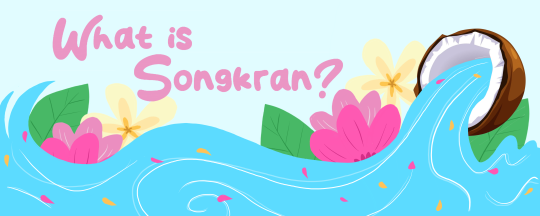
🌸Prompt Explanations🌸
These are some quick prompt explanations for some of our prompts. Many of these will have dedicated posts with further details.
Water guns, bowls, & ceramic water jars
Typically used for the water fights that happen during the celebration.
Water bowls are also used during the bathing of Buddha images and water pouring with elders.
White clay filler
A type of scented powder that comes in various colors. It has many uses, but during Songkran, it is smeared on people's faces, bodies, or even cars as a part of the water fight.
Nam Ob
Nam Ob is a scented water with powder in it. It is used to mix with water and for bathing a Buddha image, pouring on to the palm of your elder as a part of the Songkran tradition, or applying to yourself after bathing (though, this last practice is out of fashion).

Floral shirts
Why do we wear floral shirts/Hawaiian shirts around Songkran? Mostly because people enjoy wearing them! Some say that when Hawaiian floral shirts started to enter the Thai market, the pattern, a 'first-bloom' flower pattern (ลายดอกแรกแย้ม*), represents the beginning of good things, such as the beginning of the Thai New Year. The bright colours give off a feeling of freshness and cheerfulness. The Hawaiian shirt became a hit, and then the practice stuck. (*Note: this name is not used anymore.)
Home & Family Reunion
Songkran is a time for family! It's a chance for a full family reunion and to catch up, especially for those who live far from home.
Familial traditions may differ, but the celebration emphasizes time going back home and spending time with family, particularly paying respect to older family members and having fun with youngsters.
Mu Kratha & Alcohol
Food and beverages are a must for a celebration! Mu kratha is delicious and fun to eat together as a group. Perfect for the occasion.
Road Accident
Songkran is also the time of year when the number of road users is higher than usual due to how everyone travels back to their hometown. As it is also the time of celebrations, alcohol is not hard to find. With these two elements together, road accidents are sadly very easy to occur.

🌸 What's SongkranFest2024? 🌸 Guidelines 🌸 Prompts 🌸 Discord & Carrd 🌸
39 notes
·
View notes
Text


for Lifeweaver's fan fic authors:
the pants he wears are called Chong Kben and it's a wrap around garment, so its not tubular pants but a single sheet of fabric draped and wrapped around the legs.
#lifeweaver#reference#overwatch 2#Chong Kben#traditional Thai clothing#Thai clothing#cultural reference#thai culture#fan fiction#fandom psa
317 notes
·
View notes
Note
I’ve been trying to look up information on Thai Buddhist funerals but all the English websites are vague or have little information. Do you have any information or websites you could recommend?
so obviously I'm not the authority on those, but I remember doing research on it back in the day + thai dramas are surprisingly realistic at portraying their culture, and even their funerals. funerals usually take either 3, 5 or 7 days. it has to be an odd day due to buddhist beliefs. there's is a water bathing ritual after death, and the body is then dressed and placed in a coffin in a temple where monks & the deceased loved ones will visit the deceased for the number of days they've chosen before the cremation. buddhist chants are of course involved, and the loved ones also pass cloth to the monks on behalf of the dead. usually a family gets a whole room for their loved one and stay with them and at least one person stays with them the whole day, greeting guests and taking care of them. finally, the body is cremated. all temples have a crematorium. some people can also actually wait 100 days after the death to cremate the deceased one (as can be seen in the lakorn chuamong tong mon.) the ashes are usually either stored in funeral chedis, which are small pointy towers present in all thai temples, or they can be stored in line around the temple if it has extra walls around it, where people will come to pray for their loved one. special merit-making also happens 7, 50 & 100 days after the person passed away. hope that helped!
xxx
29 notes
·
View notes
Text
Becky as this year's Miss Songkran


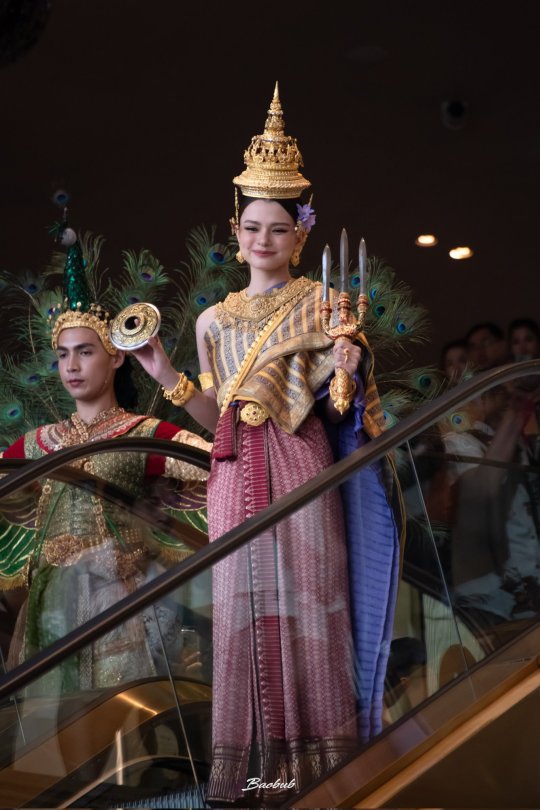


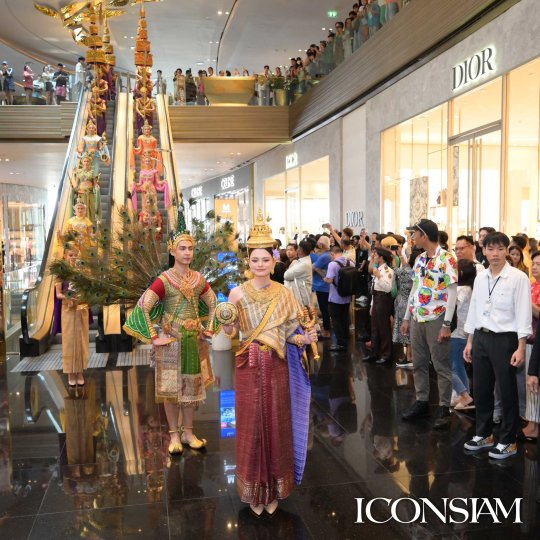

Every Songkran is presided over by a mythical daughter of the decapitated God Kapila Phrom.
There are seven daughters in total. This year it is the turn of Mahothornthewi. She wears purple and rides a peacock.
In her right hand she holds a chakram and in her left she holds a trisoon.
A water hyacinth is placed behind her ear and her stone is black onyx.
Her job is to carry her father's head in a grand procession for Songkran, before returning it to its icy cave.
#songkran#songkran 2024#thai new year#thai culture#becky armstrong#gap the series#gl#traditional thai costume
62 notes
·
View notes
Text
The plan was to start watching The Sign by divvying up the series into two episodes per day until I could finish. Well…that plan went completely out the window and I ended up binge watching the entire thing in one go. So, as I try to gather my thoughts, I wanted to sort of get my feelings out there on what I thought was an incredible show before I finally unfilter the tags (as to avoid any outside influence on my opinion).
Let me preface this by saying that this is going to be an incredibly bias opinion given my cultural upbringing and background (I'm half-Thai and I've spent almost half of my life living in Thailand), so please take that into account before reading any further. I metaphorically removed my western-lensed glasses while watching this series and preferred to watch as a Thai viewer, which probably made the more confusing or difficult parts of the show a lot easier to swallow. So, yes, I will admit that the show was not perfect by any means, but I was able to overlook a lot of its shortcomings given the parts that had been done so well and what this series could mean for Thai QL media going forward.
My goddess, where do I even start…
I'm a sucker for the reincarnated/fated lovers trope, so the show had me before it even started. What I absolutely loved the most about the romance and the A+ chemistry was that it didn't dominate or singularly drive the story, which was refreshing to see. It gave room to explore the fantasy/mythological elements of the show, the investigatory plotlines (which we'll get to later), and the relationships of the characters surrounding the "main leads".
Episode 3, my beloved, was what solidified my trust in this series and served as the foundation for the personalized experience I curated in my continued viewing. First off (and a bit of a side note), seeing Yoshi show up as Sand just made my heart super happy. I've been following her off and on since 2018, and she was one of the only things I actually liked about หมอ มือ ใหม่… but I digress. Behind the main story (and maybe even because of it), this episode was, for all intents and purposes, a love letter to Thai culture and its religious mythology. Which, when you consider how much international draw a BL series can hold, is truly momentous. International viewers got to experience the Bang Fai Phayanak (the naga fireball festival) that occurs every Wan Ok Phansa (the last day of what is considered Buddhist Lent) and the significance it holds over Thai history and culture. Using this as the stepping stone to establish the importance of the series' reliance on naga folklore…brilliant! The episode was also the viewers' introduction to the Buddhist idea of the cyclical intermingling of karmic fates. How the implications of an interdependence on one fate more than the others would later define the relationship between Phaya, Tharn, and Chalothorn…genius! All of this!? In one episode…of a BL!? I was overwhelmed by a sense of cultural gratitude and pride, that I still can't quite shake. I think Saint knew exactly what he was doing when he chose to adapt this series and I love him even more for it.
Aside from the cultural dependency and relevance, the show delivered so much beyond that as well. The production quality sailed high above previous BL standards and, in turn, lent itself to beautiful visuals and cinematography.
The casting! Billy and Babe's chemistry was just so *chef's kiss*. I knew Billy would absolutely smash it in the role of Phaya, but I often forgot that this was Babe's first ever acting role. It was an undertaking, that you could tell, he did not take lightly. Heng!? Wow! What a performance! He's been a staple in every Idol Factory series thus far, but he really nailed the purely villainous role of Chalothorn. Gap as Yai? No notes. He was able to flesh out what could have been a very one-dimensional character. Tack and Poom as Khem and Thongtai were a welcome levity inbetween, what was otherwise, a more weighty plot.
If I had to address any gripes I had with the series, there were only two that really stood out:
1) I wish the moments/conversations between Tharn and Chalothorn that eventually led to Tharn's return hadn't happened off-screen. There was a lot left to be resolved that could have been explored in that instance. But using my own inference based on Tharn as a character, his relationship with Chalothorn, and the core of his personality, I could kind of piece together how that ending came to be.
2)The lesser intriguing elements of the investigation storylines were shaky, at best. (If you were looking for the show to have a firm western-influenced ACAB agenda, then I'm sorry to say you were setting yourself up for disappointment. As much as I selfishly wanted it to be, this series was never going to be that show, it's a Thai drama.) From a Thai perspective, it made sense that the "copaganda" aspect of the series focused on the incompetency and inefficiency of a police force where justice is often informed by wealth and greed. I got an idea of what the show's stance on the matter was supposed to be but the overall plot and its consistency got lost somewhere within the final execution.
Other than that, I was left feeling satisfyingly content with where the series landed and I will continue to highly recommend it. It's easily one on my top five favorite Thai BL dramas and just Thai dramas in general! And…
There is such a rich history of mythology and folklore left for the show to still sink its teeth into: the garuda of it all, the pre-existing feud between the naga and garuda and why that is… Aside from a few minor specificities that were missing from naga folklore (their exclusion didn't really detract from anything, but it could have served to benefit non-Thai viewers), all of that could be addressed in a second season. Which, at this point, seems pretty likely 🤞🏾🤞🏾🤞🏾 and would be HUGE in the BL world.
PLEASE, LET IT HAPPEN! 🙏🏾🙏🏾🙏🏾
#the sign#the sign the series#thai culture#thai mythology#thai bl#i've had a very productive unproductive 12 hrs#i need sleep#i need to catch up on work#i formally apologize to my followers who are about to be flooded with 'the sign' content#i'm excited to finally get to see all the fan creations and gifs#😊😊😊#koda watches bl
50 notes
·
View notes
Text
Something exciting is coming to QnD!
I hope you're gathering some positive quick'n'dirty energy, because I'm sneaking around and talking with folks and getting something special ready for this Friday. 😏
This cute banner remix by @shou-jpeg will clue you in about what's coming:

*banging fist on table* Collaboration!
You can follow @songkranfest and learn about the event here: SongkranFest
💦
19 notes
·
View notes
Text

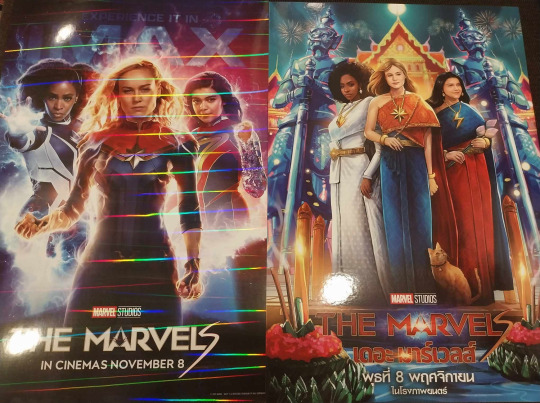
I saw The Marvels.
I got to see MY Captain Marvel on the big screen 😭
I loved it.
I'm gonna see it 10 more times.
Thank you to Maiimou for the beautiful poster of the Marvels in traditional Thai clothing (with Goose!) at the Loy Krathong festival!! I can't wait to hang it up on my Marvel wall!! Yes, I will be wearing Monica's incredibly gorgeous look here as well!😭❤️
107 notes
·
View notes
Text
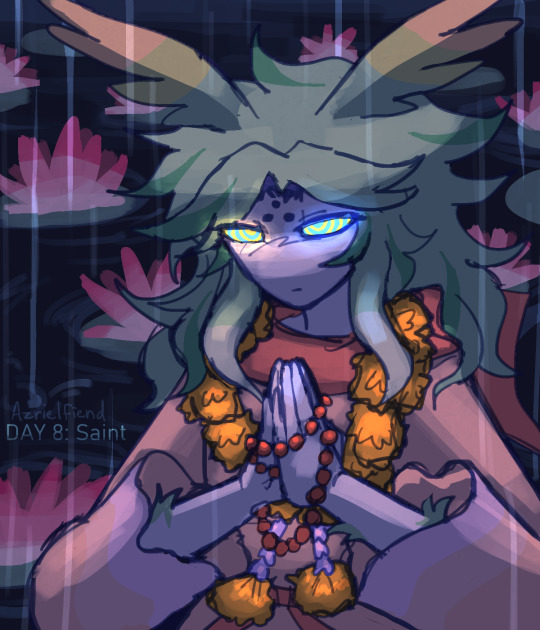
day 8 saint
enlightenment
inspo/ramble below!!! (kind of long!!)
this relates to my ramble about me loving how saint is connected to buddhism. i actually rambled about it after i finished this drawing. (i do them early in advance) anyway! the flowers around saints neck is supposed to be a marigold garland (phuang malai in thai) seen below:

theyre very heavily tied to buddhism and thai culture, in buddhism it is used to show respect to buddha, you commonly see people praying with marigold garland wrapped around their hands while their hands are clasped together. they are also often put around buddhist/hindu statues, like this :)

in thai culture, its used/offered to as gifts, or someone of importance. if you see big ones wrapped around their necks its to show the important person in an event, like the groom and bride in a marriage! i find that neat.
the lotus flower in the back also connects to this, it is not only buddhism related, but its also a reminder of the place where i grew up in! thailand is split into provinces, think of them like states for the US. ubon ratchathani's symbol is the lotus flower, and you see in its flag and seal (seen below) ubon ratchathani is also connected to laos, and i actually went to the border to see it myself, i saw the two colored river that splits thailand and laos land!
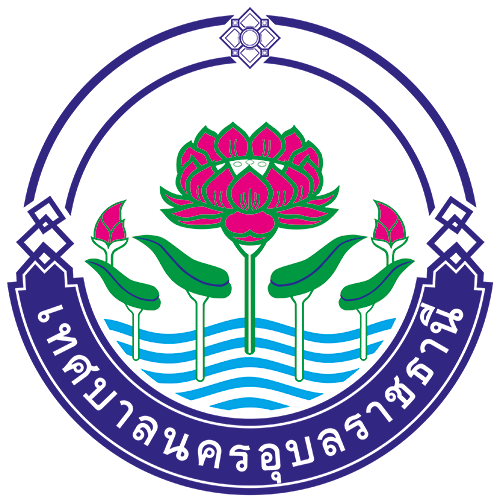
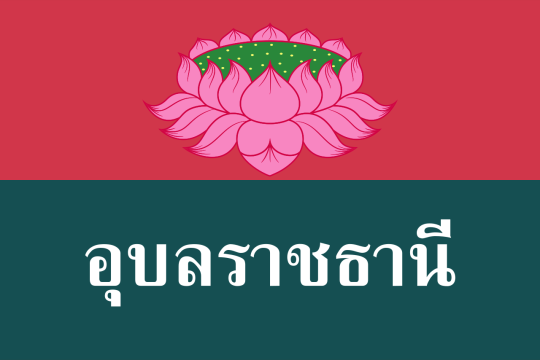
the first one is the one im most common with, but theres a lot of variation of these two. they always have the lotus flower included though, thought that was really cool!)
lotus flowers also grew in my school and was the symbol of the middle school i used to go to. i visited the river often. connecting everything... haha
i actually used to hold those wooden beads when i prayed in middle school. it felt nice to touch. most of the stuff i was taught was passed down to me orally, so i might not remember every detail.
this drawing is very personal to me. i love putting my culture into my favorite game/fandom, and i hope you enjoy it as much as i did! i encourage you to research about thai culture in general, its very interesting, even if i skipped history class most of the time.
thank you for listening to me talk. i think im just very happy when i get to express about my culture and ethnicity. hopefully i can do it again :)
#my art#rw art month#rain world#rain world downpour#rw saint#hs!slugcats#thai culture#buddhism#rainworld
91 notes
·
View notes
Text
Info for writer in Thai series fandom: Pronouns and prefixes
Phi, Nong, Hia, Jèe, Tee, Muay, Khun, Phom, Nai, Tur, Nhu, Taan, Chan,Rao, Gae, Mung, Gu, Man
พี่ Phi
Gender-neutral
Can be used with or without a name.
Polite but not particularly formal
Can be used to refer to the first, second, or third person.
The literal meaning is "elder sibling," but it can be used to call anyone older. And since it's polite but not too formal, it gets used all the time. The chance that someone will get offended by being called Phi is really low. It can also refer to a lover, despite being a family term. I understand that it might look a bit weird when someone tries to translate it to English and decides to use bro or something along that line, but it's normal here.
Sometimes older relatives will call a child in their family that has a younger sibling Phi, and in that case, the child might call themselves Phi when speaking to them too. But that is the only situation I know of where the one Phi refers to, in a non-teasing way, is younger. (Not counting times where both parties didn't know each other's age and so they both insisted on calling the other Phi to be polite.)
When someone calls themselves Phi, they might refer to the other party as nong, khun, nai, tur, nhu, name, or pet name.
น้อง Nong
Gender-neutral
Can be used with or without a name.
Polite but since Thai culture focuses on respecting the elderly a lot, terms that are used to address someone younger can sometimes be seen as disrespectful.
Can be used to refer to the first, second, or third person.
Nong is Phi's counterpart. Its literal meaning is "younger sibling." It is mostly used in the same way as Phi, but for younger people. And, unless they are related, when someone calls themselves Nong, they will likely only refer to the other party as phi (with or without a name). As for when they are related, like, when they talk to their grandma, and they refer to themselves as nong+name they, for obvious reasons, will refer to Grandma as Grandma rather than Phi.
เฮีย Hia
Masculine
Can be used with or without name.
Casual
Can be used to refer to the first, second, or third person.
The literal meaning is "elder brother" but get use for older man in general too. The word has Chinese roots (Teochew dialect), so if someone is referred to as "hia", it's safe to assume he has a Chinese ancestor, but not all people who have a Chinese ancestor will be referred to by the word that has Chinese roots. It's up to their personal preference. The same is true for jèe, tee, and muay.
เจ๊ Jèe or Che or Jay (I'm not sure how to write this in english)
Feminine
Can be used with or without name.
Casual
Can be used to refer to the first, second, or third person.
The literal meaning is "elder sister." For some reason, people use it to call women who are in charge of small businesses a lot, especially in the restaurant and construction industries. While it's not exactly rude, many people don't like it.
ตี๋ Tee
Masculine
Use without a name.
Casual
Can be used to refer to the first, second, or third person.
The literal meaning is "younger brother." Sometimes it gets used as a nickname or to describe people who have light skin and single eyelids. Most don't see it as a negative thing. People won't use it to refer to other people's younger brothers in the same way that you use the word "younger brother." For example, they won't say "how your tee is doing" but they might say "how tee is doing."
หมวย Muay
Feminine
Used without a name.
Casual
Can be used to refer to the first, second, or third person.
The literal meaning is "younger sister". Used just like tee.
All four hia, jèe, tee, and muay may say with ah in the front. like ah-muay, ah-hia It didn't add or change any meaning of the word. It's just a sound.
คุณ Khun
Gender-neutral
can be used with or without a name.(I kind of feel like Khun with the name can be a bit more respectful and Khun without a name can be a bit more casual)
Formal
can be used to refer to a second or third person.
It can be translated to you, miss, mister, sir, etc. It can also be translated to virtue, benefit, and the like in other contexts, but we won't talk about that.
Most formal settings will use khun, with the exception of those who have a rank or special prefix like doctor or soldier. In the workplace, co-workers will use khun to call each other if they are not yet close. In a hospital, the doctor and nurse will use khun to call the patient, and the patient will add khun to the word that means doctor and nurse when calling them. In universities, many professors use khun when they talk to students. Even in school, specifically in my class, we used to call each other Khun(without names) before we grew up and gradually became more familiar with bad words like Gu(กู) and Mung(มึง).
**If we already call someone using "Khun + name" as a second person, then it is likely to be used as a third person too.
But just because it's not quite casual doesn't mean it can't be intimate. Many lovers will call each other khun. In some pairs they will both use it. In some pairs only one of them will use it and the other may use their lover's name or pet name. Like my grandparents, my grandma called my grandpa khun+name and he called her by her name.
If only one of them used khun to address the other, the chance is they are the younger of the pair.
The pairs that used khun were usually people who had used it since the beginning before they got together. But they might just try many ways to call each other and then decide that they like it best.
ผม Phom
Masculine
used without a name.
Quite formal and polite.
used to refer to the first person only.
translated to "I". It is a common way to call themselves as it is appropriate for all ages and all occasions. Children call themselves that when they talk to their mom and all the other adults in their life. A grown man called himself that when he talked to his subordinate and supervisor alike. It may be paired with khun, tur, tan, nai, phi, hia, jèe, or other party names.
นาย Nai
Masculine
used without a name.(when used as a pronoun)
casual pronoun that is quite polite, an official title for every man aged more than 15 years old, and can also be translated to boss, owner, employer, etc. But in this chapter we are going to talk about it as a pronoun only.
It can be used to refer to a second or third person. But for the third person, it will be in a very specific form. It will be along the lines of "that person/that one (นายคนนั้น-nai-kon-nan), you remember right?" And nothing else. At least there is nothing else I can think of.
It translates to "you". It's not the most popular nowadays, but it's not very rare either. It is mostly used among friends and people around the same age.
เธอ Tur
Gender-neutral but can be considered a little more feminine than masculine in the present time.
used without a name.
It is polite but only used to address someone who is at the same or lower level, never higher.
Technically, it can refer to both the second and third person. However, it is mostly used in the second person these days. It can be seen as a quite sweet way to call others. Many couples used it.
หนู Nhu
Gender-neutral but considered more feminine than masculine.
It can be used with or without a name.
can be used to refer to the first, second, or third person.
It is used by young boys and girls to call themselves when talking to older people, but when most of the boys grow up a little, they will likely stop using it. In their teen years, it's quite rare to see them call themselves that, except when they talk to their mom or people they used to use it with when growing up. Most of the girls will stop too, but a lot slower. Some (not the majority in my opinion, but I also wouldn't say it's that small of a percentage) might use it well into adulthood, like until most people around them are not that older than them anymore, and some, typically those who view their position as low in social standing, will use it even with people younger than them (but in a higher position in their opinion). When it's used by older people to call younger people, it's usually to girls more than boys and quite a young person more than an adult. It is possible to offend the receiver by calling them nhu since it can be seen as not taking them seriously, belittle them, or treat them like a child. It's polite to call yourself nhu, but by doing that, you risk presenting yourself as in a lower position than who you speak with, young, and not in a position of power.
ท่าน taan
Gender-neutral
It can be used with or without a name.
polite and formal.
can be used to refer to both second and third persons.
can be translated to you, he or she. It's used when we call someone with a lot of respect. For example, royalty, monk, CEO, your cat whom you will serve and die for, president.
ฉัน chan
Gender-neutral
used without a name.
Polite
used to refer to the first person only.
translated to "I". Used when talking to someone the same age or younger a lot more than when talking to someone older. Get paired with khun, tur, gae, and taan.
เรา Rao
Gender-neutral
used without a name.
Polite
Can be used to refer to the first, or second person.
Translate to I, we, or once in a while, you. Polite way to say "I", and a normal and not more polite than usual way to say "we". It's usually used only with people in the same age group. It was used as "I" by Ae from love by chance.
แก gae
Gender-neutral
used without a name.
A little rude, but less rude than Mung.
It can be used to refer to both second and third persons. But the second person is more common than the third person.
translated to "you." Many girls in BL used it. It can be used by anyone at any age to call anyone the speaker is close to or isn't afraid to be rude to.
มึง Mung
Gender-neutral
used without a name.
Rude
used to refer to the second person only.
The meaning is "you."
กู Gu
Gender-neutral
used without a name.
Rude
used to refer to the first person only.
The meaning is "I."
Both Mung and Gu get used in the series all the time, so I don't know what to add, but it feels weird if I don't include it.
มัน Man
Gender-neutral
used without a name.
Rude
used to refer to the third person only.(if used as pronoun)
Translate to it(normal) or he/she(rude).
+Bonus
"You" and "I" in English as a pronoun when speak Thai.
It's not that common, but it's also not that weird. People who do that are those who typically also use many other English words. As for the situation, it should be in a casual setting with people who are on the same level or lower in social status, i.e., not an elder, teacher, boss, ect. And like in English, you and I are gender neutral.
Used only the name all the way, no other pronouse.
as a first person
It's more feminine than masculine, since it's seen as an attempt to be cute. I did use it with my family growing up, so it was natural for me to always use it with them, but when I used it with my friends, I did it with the intention of irritating them by acting overly cute.
as a second person
It's also more feminine(?), but for the speaker, not the name's owner. I'm not so sure about why. I just don't see men do it(except with kids). You should be at some level of closeness before you do it. I usually use it with my classmate, who I am not super close with but not, not close either. I guess it's just my default when I don't want to be rude bu also afraid to be overly polite and weird them out.
Used name to refer to a third person is just a normal way of speaking.
Some titles used in Khun Chai's explanation
Here
Other things
There are no words for your, his, and her in Thai, so if it can be translated to you, it can also be your and so on.
Calling someone noticeably older only by their name is not a common practice and can easily be seen as rude. There is always a prefix one can and should add when addressing someone older.
People who met in a casual setting, have some level of closeness, attempt to be close, or are just easygoing usually use the same word set for family to call each other. You can see some in Chapter 14 if you want to. It's kind of the default choice, actually.
Index
205 notes
·
View notes
Text
Congrats My Ex || Madness Overloaded, Treat for the Eyes...well...that's it.

A treat for the eyes. Not for the soul - A nice attempt to blend Indian and Thai culture.
Hoooooo boy! Where do I start?
From the moment I saw the trailer I knew what to expect. I knew what kind of film it is going to be and even though I wanted to be wrong, I am not. It's a rom-com and as cringe as I thought it would be. But I am not disappointed. In fact, the minus points of this film is also the plus points.
Spoiler Alert: Proceed with Caution

So, Risa (Bella Ranee) finds out that she is the wedding planner of her ex boyfriend (Arun/Mahir Pandhi). Ouch!

And then as if it is not hurtful enough, the emergency photographer she had to hire is actually another ex (Tim/Bright). Wowzers!
When asked how stereotypical melodramatic rom-com you want it to be ? They really said HELL YES!
From the Indian soap opera like sequences, to overly dramatic horse riding to overacting sidekicks to garbage dialogues, try-hard-to-make-people-laugh slapstick comedic moments it had everything!!!

This is me when I see my bestie making a fool of herself before her crush
But still I enjoyed everything. Why? It was fun to watch a nice amalgamation of the two cultures.
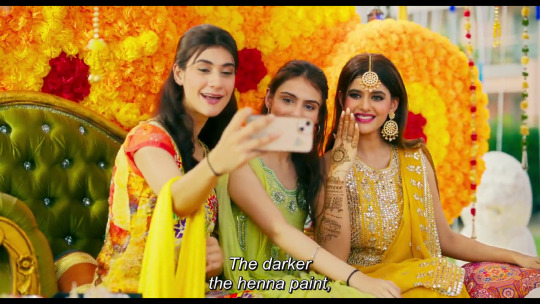
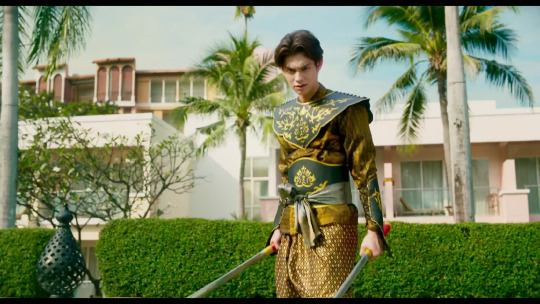
Bright in Sherwani

I have a little crush on Anahita Bhooshan ngl
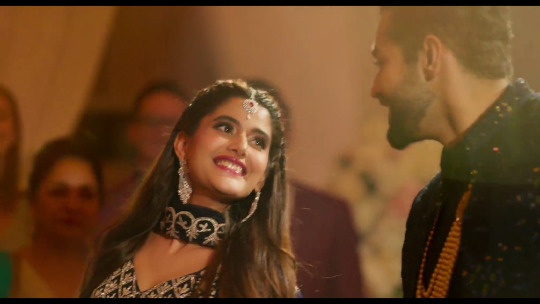
The Bollywood style dance number
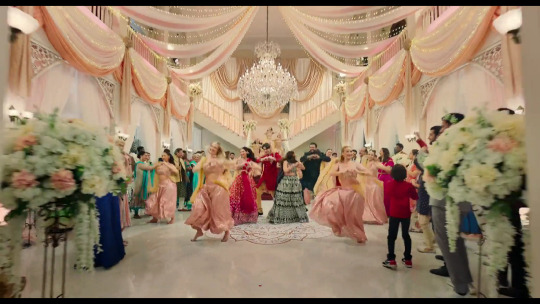
And the depiction of Indian wedding, well more like typical North Indian (mostly Punjabi style, although Sangeet is now almost a part of all kind of Indian weddings) upper class traditional wedding.
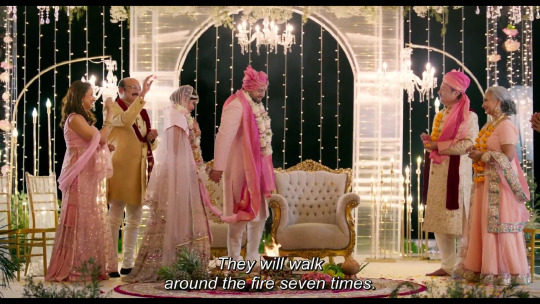
This is Karan Johar style but minus the extreme emotional parts.
I was this close to tear my hair in the scene where Arun is riding (get your minds out of the gutter, he is literally lying akimbo on the car trying to stop it - talk about Bollywood...) the bonnet of the car but I was also snorting with laughter.
The dream sequence where Risa is getting married to Arun and Monica is slapping her repeatedly is my flashback to overtly melodramatic soap operas. As much as I was cringing hard, I was also having fun as the film is sarcastically making fun of it. I was both laughing and crying.
Honestly, there is not much story here. The only thing you see is the grandeur. Don't come here expecting much acting and plotline. And no expectations. It's a one time watch film. But I would applaud the makers of it for even bringing it to existence.
I hope we get more good stories that reflects more of the two countries and the cultures.
Also posted on MDL
#indian cinema#indian culture#thai drama#thai actors#bright vachirawit#bella ranee campen#thai culture#bollywood#bollywood movies#indothai#culture#mahir pandhi#anahita bhoosan#congrats my ex#amazon prime#ranee campen#Youtube
20 notes
·
View notes